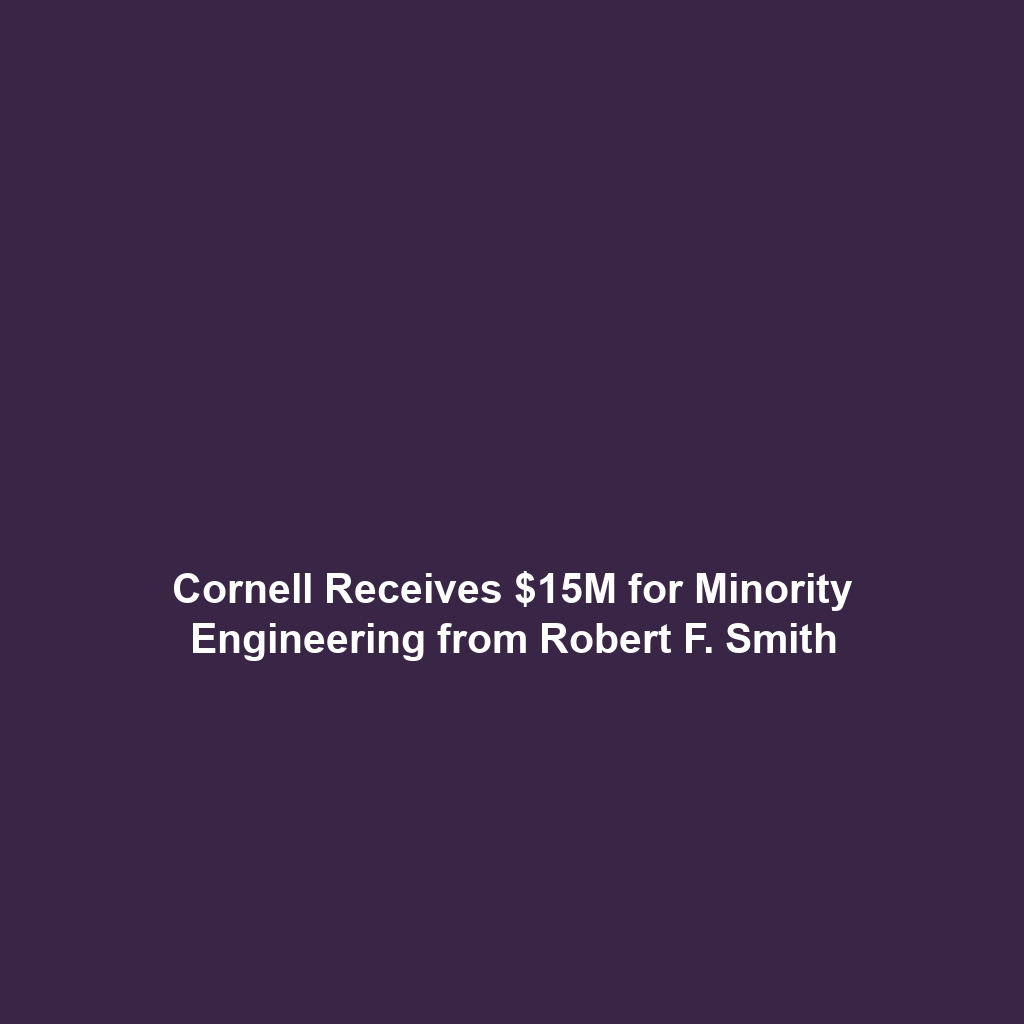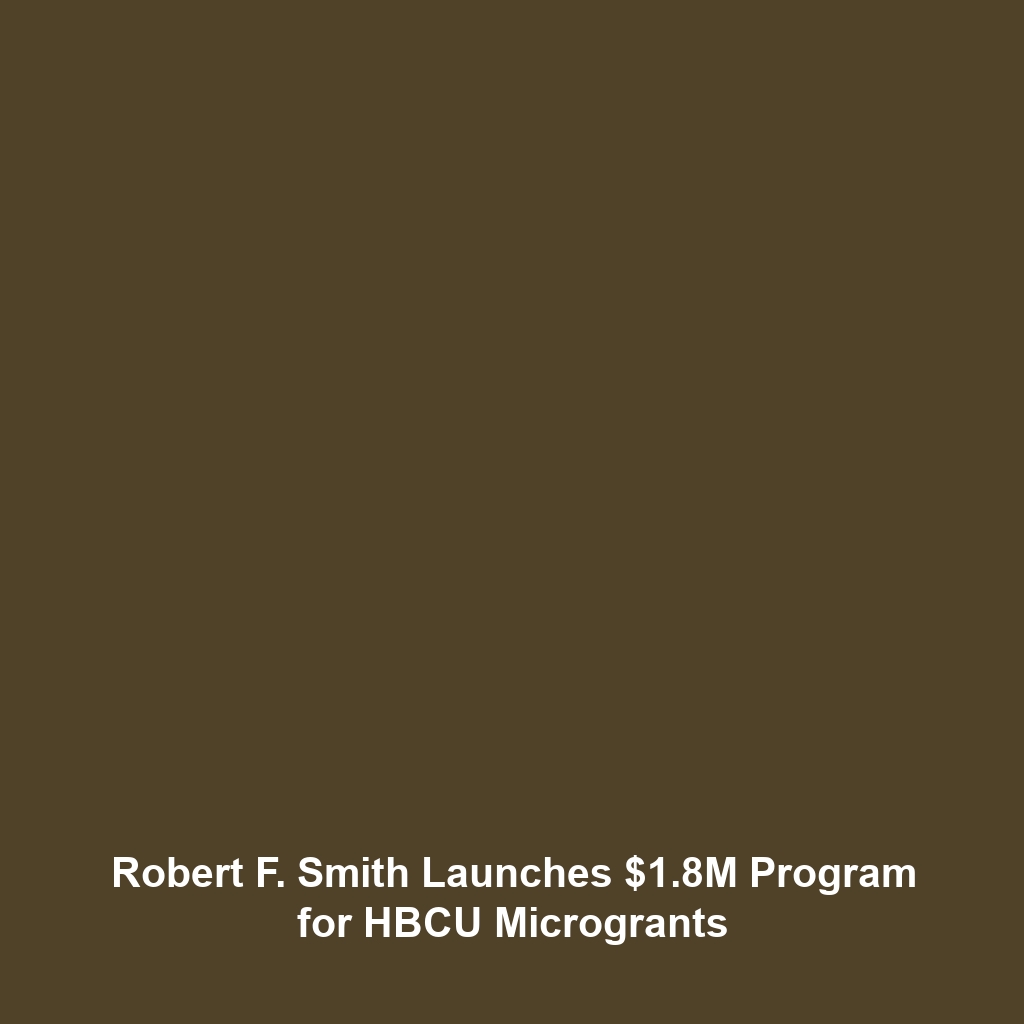Your cart is currently empty!
Tag: financial assistance

Cornell Receives $15M for Minority Engineering from Robert F. Smith
Cornell Receives $15M for Minority Engineering from Robert F. Smith
Cornell Receives $15M for Minority Engineering from Robert F. Smith
Billionaire philanthropist Robert F. Smith has pledged a $15 million donation to Cornell University, with the aim of increasing opportunities for minority students in engineering. This significant gift, aimed at expanding support for underrepresented groups within STEM (science, technology, engineering, and mathematics), is part of Smith’s broader commitment to enhance diversity in these fields.
Impact of the Donation
Smith’s donation will create a variety of programs and scholarships designed to support minority students at Cornell’s College of Engineering. This funding is expected to help bridge the financial gap that many students face, facilitating a more inclusive environment for education in engineering disciplines. As part of the initiative, Cornell plans to implement mentorship programs, internship opportunities, and other resources that provide academic and professional development.
According to a report from the National Science Foundation, minority representation in engineering remains significantly lower compared to their white and Asian counterparts. Smith’s donation is anticipated to help counteract these disparities by not only providing financial assistance but also by fostering a support system that encourages students to pursue engineering careers.
Robert F. Smith: A Background
Robert F. Smith is the founder of Vista Equity Partners, an investment firm focused on software companies. He is widely recognized for his philanthropic efforts, particularly in the education sector, aiming to abolish systemic barriers for minorities. Earlier this year, Smith gave a notable donation of $50 million to the University of California, Berkeley, to support engineering and computer science initiatives targeting black and underrepresented students.
In his remarks regarding the donation to Cornell, Smith underscored the importance of increasing diversity within STEM fields, asserting, “A diverse workforce is a key driver of innovation. By supporting minority students in engineering, we can provide them with the tools they need to succeed and help foster a new generation of leaders.”
Cornell University’s Commitment to Diversity
Cornell University has long been dedicated to enhancing diversity and inclusion within its academic community. The university’s administration has made efforts to increase outreach to underrepresented communities, working closely with various organizations and high schools to encourage minority students to apply to engineering programs.
In light of Smith’s donation, Cornell President Martha Pollack expressed her gratitude, stating, “This significant investment will allow us to expand our efforts to support minority students, empowering them to achieve their academic and professional goals. We are dedicated to fostering a more inclusive environment for all students.”
Challenges in Minority Representation in Engineering
Despite ongoing efforts to promote diversity within engineering, challenges persist. A report released by the American Society for Engineering Education (ASEE) highlights that while enrollment in engineering programs has seen an increase, graduation rates for minority students still lag behind their peers.
Financial barriers, combined with a lack of representation in faculty and industry, can create obstacles for minority students. Smith’s investment is viewed as a necessary step towards alleviating some of these challenges and fostering a supportive academic environment.
Looking Forward: The Future of Engineering Education
As institutions like Cornell commit to enhancing diversity, the impact of donations such as Smith’s is likely to be profound. By providing financial aid and additional resources, Cornell anticipates nurturing talent that might otherwise be lost due to economic constraints or social barriers. This aligns with a national trend in higher education where enhancing diversity is viewed as imperative for sustained innovation and growth in the STEM sectors.
Experts in educational equity argue that the long-term benefits of diverse student bodies extend beyond the individual students. Diverse teams are shown to produce better outcomes, offering a variety of perspectives that can lead to innovative solutions in engineering challenges.
Conclusion
Robert F. Smith’s $15 million donation to Cornell University highlights a crucial commitment to fostering diversity within engineering. As the university implements programs designed to assist minority students, it embarks on a path that could redefine the landscape of engineering education.
Through strategic investments in education and support structures, Smith’s contribution stands to create lasting change, equipping future generations of engineers with the resources and opportunities necessary for success. Ultimately, such initiatives are essential as the field of engineering continues to evolve in complexity and scope.

Robert F. Smith Launches $1.8M Program for HBCU Microgrants
Robert F. Smith Launches $1.8M Program for HBCU Microgrants
Robert F. Smith Launches $1.8M Program for HBCU Microgrants
Billionaire philanthropist Robert F. Smith has announced a new initiative to support students at Historically Black Colleges and Universities (HBCUs) with a $1.8 million microgrant program. This funding aims to provide emergency financial assistance to students who face unforeseen financial burdens that threaten their academic progress.
Purpose of the Microgrant Program
The microgrants are designed to address pressing needs such as tuition, housing, and technology costs, which have become increasingly burdensome for students during challenging economic times. According to the National Center for Education Statistics, HBCU students often face unique financial challenges, with a significant percentage relying on federal loans to fill funding gaps.
Smith, who is the founder of Vista Equity Partners, stated, “Education is a direct pathway to wealth creation and economic mobility. We must ensure that no student is unable to complete their education because of unforeseen costs.” This statement underscores the initiative’s goal to help students continue their education without financial interruptions.
Background on HBCUs and Financial Challenges
Historically Black Colleges and Universities play a critical role in the education of African American students in the United States. Established during the era of segregation, these institutions have served as vital sources of higher education for underserved communities. Despite their importance, HBCUs have long struggled with significant funding disparities compared to predominantly white institutions.
Data from the United Negro College Fund reveals that HBCUs receive significantly less funding from federal and state sources, making it difficult for these institutions to maintain financial stability and provide adequate support for students. As a result, many HBCU students often find themselves in precarious financial situations.
Smith’s Commitment to Education
Robert F. Smith has been a long-time advocate for education and economic empowerment, particularly for underrepresented communities. His philanthropic efforts extend beyond this recent microgrant initiative; in 2019, he made headlines when he announced that he would pay off the student loan debt for the entire graduating class of Morehouse College.
Since then, Smith has continued to focus on initiatives aimed at increasing access to education for marginalized communities. The new microgrant program fits into this broader narrative of his commitment to removing financial barriers for HBCU students.
Implementation and Distribution of Funds
The $1.8 million in microgrants will be distributed directly to HBCU students. Eligible students will be able to apply for funds through their institutions, setting up a streamlined process to ensure timely assistance. The program will specifically target students who encounter unexpected expenses that may impede their ability to continue their education.
Institutions participating in the program will be required to establish criteria for disbursement, ensuring the funds are directed to those in most need. This localized approach aims to maximize the impact of the microgrants by allowing schools to assess the specific challenges faced by their student bodies.
Expert Opinions on the Initiative
Experts in higher education have praised the initiative, stressing the importance of addressing financial barriers that can derail students’ academic journeys. Dr. Marybeth Gasman, an expert on HBCU education, commented, “Microgrants can be transformative for students who are on the brink of leaving school due to financial stress. This program has the potential to keep many students on track to graduation.”
Furthermore, financial aid experts emphasize that even small amounts of financial support can significantly affect a student’s decision to remain enrolled. Research has shown that students who receive emergency financial assistance are less likely to drop out and more likely to complete their degrees.
Conclusion: Moving Forward with Impact
Robert F. Smith’s $1.8 million program for HBCU microgrants represents a crucial step in supporting students facing financial insecurities. As many students prepare for the upcoming academic year, this initiative will help alleviate some of the pressures that can hinder their educational pursuits.
By focusing on emergency needs, Smith’s program highlights the importance of ensuring that every student has the opportunity to succeed academically, regardless of their financial circumstances. As the initiative rolls out, it holds promise not only for individual students but also for the broader goals of equity and access within higher education.
For more information on how to apply for microgrants and the specific eligibility requirements, students are encouraged to contact their respective HBCUs directly or visit the program’s official website.